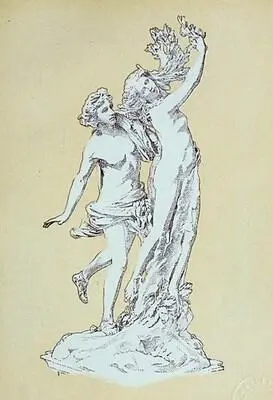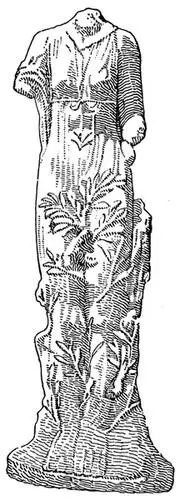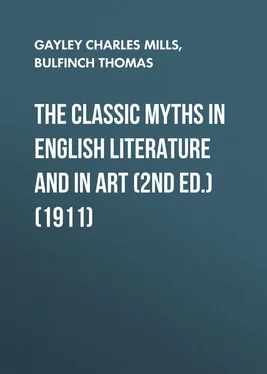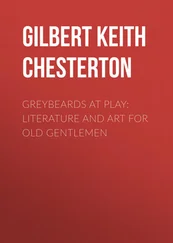Thomas Bulfinch - The Classic Myths in English Literature and in Art (2nd ed.) (1911)
Здесь есть возможность читать онлайн «Thomas Bulfinch - The Classic Myths in English Literature and in Art (2nd ed.) (1911)» — ознакомительный отрывок электронной книги совершенно бесплатно, а после прочтения отрывка купить полную версию. В некоторых случаях можно слушать аудио, скачать через торрент в формате fb2 и присутствует краткое содержание. Жанр: foreign_antique, foreign_prose, на английском языке. Описание произведения, (предисловие) а так же отзывы посетителей доступны на портале библиотеки ЛибКат.
- Название:The Classic Myths in English Literature and in Art (2nd ed.) (1911)
- Автор:
- Жанр:
- Год:неизвестен
- ISBN:нет данных
- Рейтинг книги:4 / 5. Голосов: 1
-
Избранное:Добавить в избранное
- Отзывы:
-
Ваша оценка:
- 80
- 1
- 2
- 3
- 4
- 5
The Classic Myths in English Literature and in Art (2nd ed.) (1911): краткое содержание, описание и аннотация
Предлагаем к чтению аннотацию, описание, краткое содержание или предисловие (зависит от того, что написал сам автор книги «The Classic Myths in English Literature and in Art (2nd ed.) (1911)»). Если вы не нашли необходимую информацию о книге — напишите в комментариях, мы постараемся отыскать её.
The Classic Myths in English Literature and in Art (2nd ed.) (1911) — читать онлайн ознакомительный отрывок
Ниже представлен текст книги, разбитый по страницам. Система сохранения места последней прочитанной страницы, позволяет с удобством читать онлайн бесплатно книгу «The Classic Myths in English Literature and in Art (2nd ed.) (1911)», без необходимости каждый раз заново искать на чём Вы остановились. Поставьте закладку, и сможете в любой момент перейти на страницу, на которой закончили чтение.
Интервал:
Закладка:
86. Shelley's Hymn of Pan.In the following verses Pan taunts Apollo as he might have done when Midas was sitting contentedly by:
From the forests and highlands
We come, we come;
From the river-girt islands,
Where loud waves are dumb,
Listening to my sweet pipings.
The wind in the reeds and the rushes,
The bees on the bells of thyme,
The birds on the myrtle bushes,
The cicale above in the lime,
And the lizards below in the grass,
Were as silent as ever old Tmolus was
Listening to my sweet pipings.
Liquid Peneüs was flowing,
And all dark Tempe lay,
In Pelion's shadow, outgrowing
The light of the dying day,
Speeded by my sweet pipings.
The Sileni, and Sylvans, and Fauns,
And the Nymphs of the woods and waves,
To the edge of the moist river-lawns,
And the brink of the dewy caves,
And all that did then attend and follow
Were silent with love, as you now, Apollo,
With envy of my sweet pipings.
I sang of the dancing stars,
I sang of the dædal Earth,
And of Heaven – and the giant wars,
And Love, and Death, and Birth, —
And then I changed my pipings, —
Singing how down the vale of Menalus
I pursued a maiden, and clasp'd a reed:
Gods and men, we are all deluded thus!
It breaks in our bosom and then we bleed:
All wept, as I think both ye now would,
If envy or age had not frozen your blood,
At the sorrow of my sweet pipings.
87. Marsyasalso was unfortunate enough to underrate Apollo's musical ability. It seems that the flute, an invention of Minerva's, had been thrown away by that goddess because Cupid laughed at the grimaces which she made while playing it. Marsyas found the instrument, blew upon it, and elicited such ravishing sounds that he was tempted to challenge Apollo himself to a musical contest. The god, of course, triumphed, and he punished Marsyas by flaying him alive.
88. The Loves of Apollo.Beside Psamathe of Argos, Coronis of Thessaly, and the nymph Clymene, who have been already mentioned, Apollo loved the muse Calliope, who bore him Orpheus, 107 107 § 118.
and the nymph Cyrene, whose son was Aristæus. 108 108 § 145.
Of his relations with other maidens the following myths exist.
89. Daphne. 109 109 Ovid, Metam. 1, 452-567.
The lord of the silver bow was not always prosperous in his wooing. His first love, which, by the way, owed its origin to the malice of Cupid, was specially unfortunate. It appears that Apollo, seeing the boy playing with his bow and arrows, had tauntingly advised him to leave warlike weapons for hands worthy of them and content himself with the torch of love. Whereupon the son of Venus had rejoined, "Thine arrows may strike all things else, Apollo, but mine shall strike thee."

APOLLO AND DAPHNE
So saying, he took his stand on a rock of Parnassus, and drew from his quiver two arrows of different workmanship, – one to excite love, the other to repel it. The former was of gold and sharp pointed, the latter blunt and tipped with lead. With the leaden shaft he struck the nymph Daphne, the daughter of the river-god Peneüs, and with the golden one Apollo, through the heart. Forthwith the god was seized with love for the maiden, but she, more than ever, abhorred the thought of loving. Her delight was in woodland sports and in the spoils of the chase. Spurning all lovers, she prayed her father that she might remain always unmarried, like Diana. He consented, but, at the same time, warned her that her beauty would defeat her purpose. It was the face of this huntress maiden that Apollo saw. He saw the charming disorder of her hair, and would have arranged it; he saw her eyes bright as stars; he saw her lips, and was not satisfied with only seeing them. He longed for Daphne. He followed her; she fled swifter than the wind, nor delayed a moment at his entreaties. "Stay," said he, "daughter of Peneüs; I am not a foe. It is for love I pursue thee. I am no clown, no rude peasant. Jupiter is my father. I am lord of Delphi and Tenedos. I know all things, present and future. I am the god of song and the lyre. My arrows fly true to the mark; but alas! an arrow more fatal than mine has pierced my heart! I am the god of medicine and know the virtues of all healing plants. Alas! I suffer a malady that no balm can cure."

Fig. 67. Daphne
The nymph continues her flight and leaves his plea half-uttered. But even as she flies she charms him. The wind catches her garments, and her unbound hair streams loose behind her. The god, sped by Cupid, gains upon her in the race. His panting breath blows upon her hair. Her strength begins to fail, and, ready to sink, she calls upon her father, the river-god: "Help me, Peneüs! open the earth to inclose me, or change my form, which has brought me into this danger!" Scarcely had she spoken when a stiffness seized her limbs; and little by little she took on the appearance of a laurel tree. Apollo embraced the branches and lavished kisses on the wood. The branches shrank from his lips. "Since thou canst not be my wife," said he, "thou shalt assuredly be my tree. I will wear thee for my crown. I will decorate with thee my harp and my quiver. When the Roman conquerors conduct the triumphal pomp to the Capitol, thou shalt be woven into wreaths for their brows. And, as eternal youth is mine, thou also shalt be always green, and thy leaf know no decay." The laurel tree bowed its head in grateful acknowledgment.
The delicious humor of Lowell's extravaganza upon the story amply justifies the following citation:
Phœbus, sitting one day in a laurel tree's shade,
Was reminded of Daphne, of whom it was made,
For the god being one day too warm in his wooing,
She took to the tree to escape his pursuing;
Be the cause what it might, from his offers she shrunk,
And, Ginevra-like, shut herself up in a trunk;
And, though 't was a step into which he had driven her,
He somehow or other had never forgiven her;
Her memory he nursed as a kind of a tonic,
Something bitter to chew when he'd play the Byronic,
And I can't count the obstinate nymphs that he brought over
By a strange kind of smile he put on when he thought of her.
"My case is like Dido's," he sometimes remarked;
"When I last saw my love, she was fairly embarked
In a laurel, as she thought – but (ah, how Fate mocks!)
She has found it by this time a very bad box;
Let hunters from me take this saw when they need it, —
You're not always sure of your game when you've treed it.
Just conceive such a change taking place in one's mistress!
What romance would be left? – who can flatter or kiss trees?
And, for mercy's sake, how could one keep up a dialogue
With a dull wooden thing that will live and will die a log, —
Not to say that the thought would forever intrude
That you've less chance to win her the more she is wood?
Ah! it went to my heart, and the memory still grieves,
To see those loved graces all taking their leaves;
Those charms beyond speech, so enchanting but now,
As they left me forever, each making its bough!
If her tongue had a tang sometimes more than was right,
Her new bark is worse than ten times her old bite." 110 110 From the Fable for Critics.
90. Marpessa.Another maiden who declined Apollo's love was Marpessa.[1] She is called by Homer "the fair-ankled daughter of Evenus."
Читать дальшеИнтервал:
Закладка:
Похожие книги на «The Classic Myths in English Literature and in Art (2nd ed.) (1911)»
Представляем Вашему вниманию похожие книги на «The Classic Myths in English Literature and in Art (2nd ed.) (1911)» списком для выбора. Мы отобрали схожую по названию и смыслу литературу в надежде предоставить читателям больше вариантов отыскать новые, интересные, ещё непрочитанные произведения.
Обсуждение, отзывы о книге «The Classic Myths in English Literature and in Art (2nd ed.) (1911)» и просто собственные мнения читателей. Оставьте ваши комментарии, напишите, что Вы думаете о произведении, его смысле или главных героях. Укажите что конкретно понравилось, а что нет, и почему Вы так считаете.












